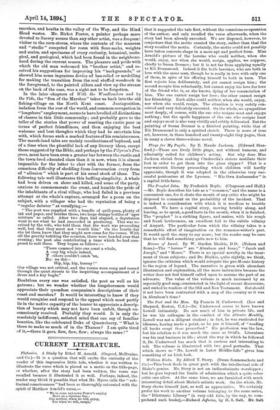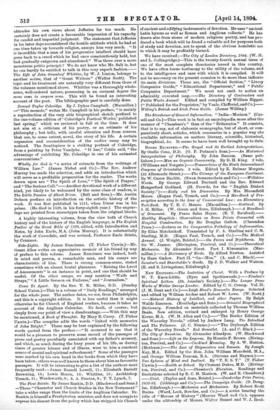William Blake. By Alfred T. Story. (Swan Sonnenschein and Co.)—This
book deals in great part with the intellectual side of Blake's genius. Mr. Story is not an indiscriminate worshipper; but he goes beyond the limits of admiration which a quite sober critic can allow. At the same time, we are furnished with much interesting detail about Blake's artistic work. On the whole, Mr. Story shows himself just, as well as appreciative. We certainly prefer his work to another volume belonging to the same series, the " Dilettante Library" (a very odd title, by the way, to com- prehend such books),—Richard Jefferies, by H. S. Salt. Mr. Salt
obtrudes his own views about Jefferies far too much. He certainly does not create a favourable impression of his capacity for candid and impartial judgment. The statement that Jefferies in his later days reconsidered the hostile attitude which he had at one time taken up towards religion, annoys him very much. " It is incredible that a man of his progressive intellect should have gone back to a creed which he had once conscientiously held, but had gradually outgrown and abandoned." Was there ever a more monstrous petitio prineipii ? We do not know who Mr. Salt is, but he can hardly be entitled to talk in this very superb fashion.— The Life of John Greenleaf Whittier, by W. J. Linton, belongs to another series, that of "Great Writers" (Walter Scott). The topic and its treatment are naturally very different from those of the volumes mentioned above. Whittier was a thoroughly whole- some, well-ordered nature, possessing in an eminent degree the mens sena in corpore sano. This will be found an interesting account of the poet. The bibliographic part is carefully done.



































 Previous page
Previous page